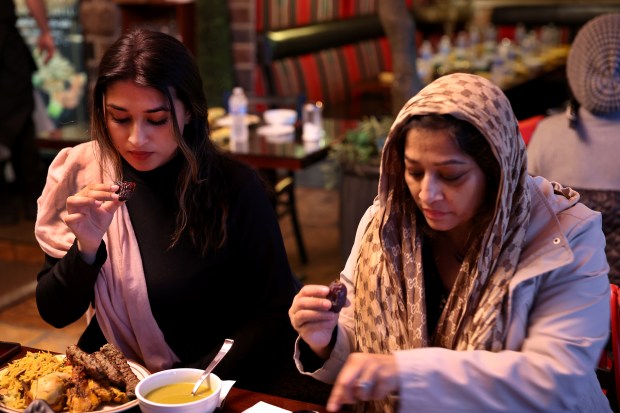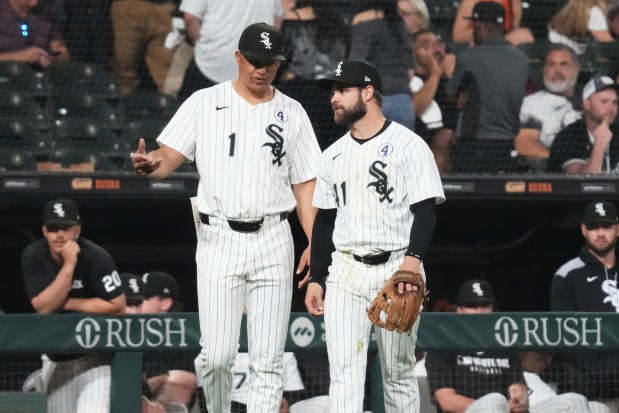As the sun sets each night during Ramadan, the call to prayer sounds on cellphones, in mosques — and, of course, in restaurants across Chicagoland. At many Muslim-owned establishments, diners and kitchen employees who have been fasting since dawn are offered a complimentary date, water and appetizers to break their fast. Then after maghrib, the sunset prayer, the feasting begins.
There isn’t one specific culinary fast-breaking tradition — beyond dates and water — shared by all the cultures that observe Ramadan, but you can find restaurants around Chicagoland with unique accommodations for Ramadan.
Buffets are popular. Yemeni cafes in the suburbs keep extended hours, bustling with activity until well after midnight. And occasionally, community hubs like the Somali cafeteria Bulsho stay open late enough to sell food for suhoor, the predawn meal. Several restaurants also committed to donating free meals or fundraising for Gaza.
At the original Al Bawadi location in Bridgeview, I was one of the first customers sitting down one evening for iftar, the fast-breaking meal eaten at sunset. The call to prayer had not rung yet. At this point, I had been fasting for almost 13 hours and my energy was fading. But it was hard not to be bolstered by the buzzing of the multiple kitchens flanking the dining areas.
This year is the 14th iteration of the iftar buffet ($40, served daily during Ramadan) at Al Bawadi, a family-owned Palestinian restaurant that opened in 2008 and has a second location in Niles. The Ismail family warned that the first few days of the buffet might be rusty. Two brothers, Faris and Hamza Ismail, took point, while parents Khalil and Ranya Ismail kept watch from their family table. The waitstaff was dressed in all black, many with hijabs or black kaffiyeh head wraps.
The dried dates and cold appetizers were flying out to tables — generous portions of hummus and baba ghanouj alongside salads. Many of these mezes were drizzled with first press virgin olive oil that Khalil Ismail hand-selected on trips to Jordan.
Other delights awaited on each side of the buffet: a gloved man preparing to serve fresh grape leaves and carve a roast lamb (zabiha halal, like all meat served at Al Bawadi). Two pitchers of sweet drinks: a brilliantly green mint lemonade and a tangy dark tamarind juice. Lentil soup ladled into generous bowls. And then, of course, the steaming dishes on the buffet: grilled kufta kebab with green and red pepper, herby molokhia, rice with almonds and parsley, and more.
Eight minutes before fast breaking, sleepy-looking customers began entering more rapidly, in sweats, in Adidas track pants, in abayas.
Five minutes before fast breaking: showtime. Lights blazed upon all the dishes.
Three minutes before fast breaking, Hamza Ismail encouraged diners to line up and prefill their oversize oblong plates.
At fast breaking time, the call to prayer sounded through the restaurant speakers: Allahu Akbar, Allahu Akbar. And so on. I grabbed a date and handed one to my wife who was filling a platter in line. We drank bottled water. Service didn’t seem rusty to me in the slightest.
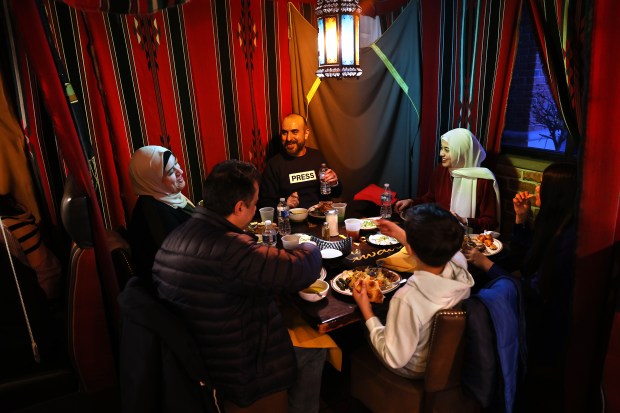
On that first night of Ramadan, five members of the Ismail family sat at their regular table (the sixth American member, Saif Ismail, was managing the Niles location’s iftar buffet; two sisters reside in Dubai). The mother, Ranya Ismail, explained that Ramadan is a time of togetherness; and since most of the family will be working in the restaurant, they make sure to break their first fast together.
Faris Ismail said all the menu items at Al Bawadi are his grandmother’s recipes, ones he grew up eating. Alongside scores of other Palestinians, she was displaced from the historic village of Ein Karem near Jerusalem during the creation of the state of Israel. Much of the Ismail family now resides as refugees in Amman, Jordan, but they still claim their culinary and historical roots. Khalil Ismail learned to cook Ein Karem’s recipes from his mother and now Hamza, Faris and Saif Ismail are learning from their father.
After dinner, a platter of chenafa, shining brilliantly, came freshly baked out of the kitchen. It was sweet, cheesy and crispy with pistachios. It was gone within minutes, but a second one eventually came to replace it. There was plenty of other sweet fare: qatayef with sugar syrup, chopped fruit, chocolate cake.
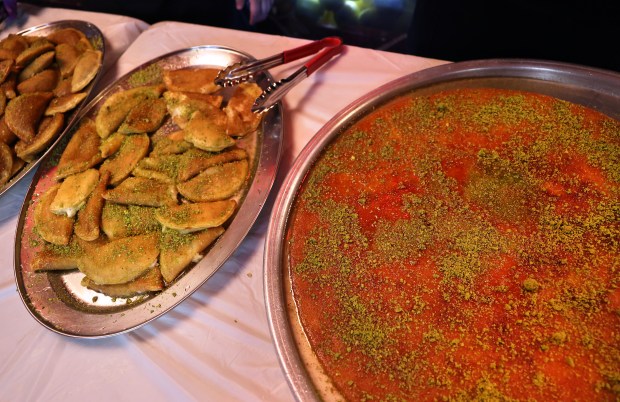
In the back, near where grape leaves are usually stuffed and wrapped, staff and customers gathered in small congregational shifts for maghrib.
And then, the caffeine. Waiters carried glass teacups out to guests. Mahmoud Alfreihat (also known as Abu Muhammad), their longtime coffee specialist, has his own special service; dressed in traditional Palestinian clothing with a red kaffiyeh, he carried a black pitcher and asked each guest in Arabic if they’d like some coffee, brewed with ginger and cardamom. When asked why serving coffee is so important to him, he answered, “Alhamdulillah.” All praises are to God.
I’ve been to iftar buffets, but the Al Bawadi experience feels more thoughtful. Some customers drive over two hours to dine. Others are local and regularly attend. Some worry it’s become too expensive.
Faris Ismail explained that a buffet is the answer to the logistics of an iftar dinner rush.
How do you feed an entire dining room that wants to eat at exactly the same time?
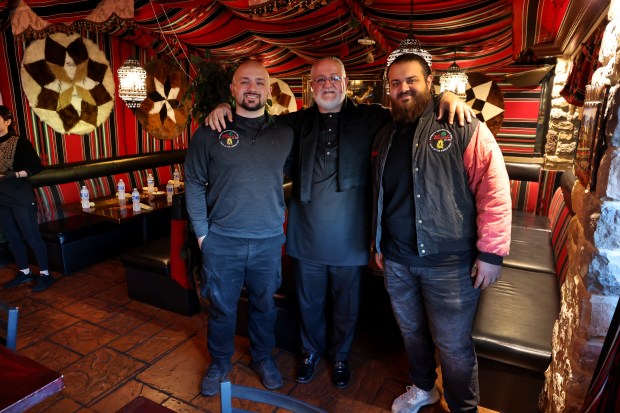
At first, there was no issue.
“We only had 10 tables,” said Faris Ismail, the eldest sibling. He was only 8 when the store opened in the remnants of an old Taco Bell. In 2010 Khalil Ismail built an extension that sat 150 customers. “But once we had a bigger capacity … it’s tough to bring out the same quality food, right at the same time to every single person that’s sitting in the restaurant.”
There’s another benefit to the buffet of course. Faris Ismail, who by his own admission doesn’t care for buffets, said, “in reality, everyone’s hungry. They want to eat as much as possible. And a buffet is the best option for that, you know?”
But Ramadan isn’t just a time for food; it’s a time for forgiveness, reflection and charity. Ranya Ismail said their hearts are with the hungry people of Gaza. They speak of staff members who have family stuck in Khan Younis during Israel’s war on Gaza. An aunt’s in-law has lost 17 family members. The Ismail family held a fundraiser for Gaza in October and hope to do another this Ramadan, after they get into the swing of service.
Soon, the dining room emptied out; some went to the mosque, some went home. Tomorrow, another day of fasting, reflection and preparation.
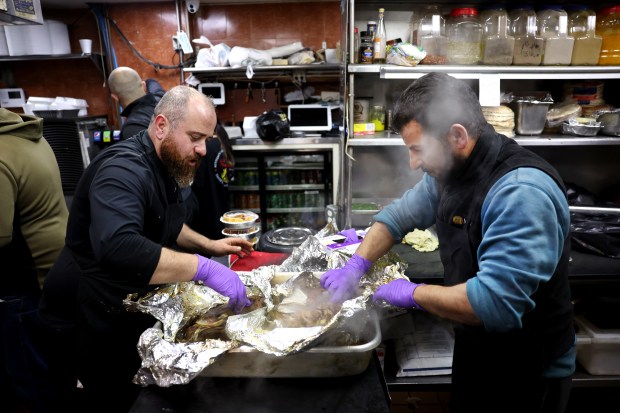
The iftar buffet is $40 with a 12% service charge. Call ahead to reserve. Al Bawadi is HMS zabiha halal certified.
Al Bawadi, 7216 W. 87th St., Bridgeview, 708-599-1999; 8501 W. Dempster St., Niles, 847-957-1999; albawadigrill.com
20 other Chicagoland restaurants with specials and late-night hours
Menus and hours change by the day, so call ahead or check websites to confirm details. All the restaurants featured here confirmed they use zabiha halal meat, but certification standards vary.
Classic iftar buffets and special menus
Anmol Barbecue
The Devon Street standby takes reservations for their iftar buffet ($25 for adults, $15 for kids 5-11), which offers nearly 20 rotating dishes, from South Asian iftar classics like fruit chaat, onion pakora and dahi barah to more eclectic fare, like rooh afza lemonade and mango habanero tikkas. Tea, desserts, Medjool dates, garden salad and raita are offered daily. They keep standard hours, noon-10 p.m. The restaurant takes pride in having its own halal slaughterhouse and groceries across the street.
2858 W. Devon Ave., 773-508-5050; anmolchicago.com
Fattoush Restaurant
South suburban Fattoush will do its annual iftar buffet each day of Ramadan, which includes traditional dishes such as ouzi with lamb, mansaf, stuffed grape leaves, kofta with tahini sauce, desserts, along with beverages like tamarind juice. Adults can dine for $36, kids ages 6 through 13 for $18 and kids under 5 eat free. Patrons are urged to call and reserve a spot ahead of time due to the holiday rush.
10700 S. Harlem Ave., Worth; 708-671-9999, fattoushchicago.com
Crepello
Enjoy suhoor at Crepello in Orland Park, which opened last year and is serving breakfast sandwiches, croissants and its signature skillets from midnight to 6 a.m. For iftar, its open buffet includes nine hot dishes, 15 salads, desserts and free coffee and tea. Adults can dine for $35, children age 6 through 12 for $15, and kids under six eat free.
15845 S. Harlem Ave, Orland Park, 708-428-9088, crepello-op.com
Jibek Jolu
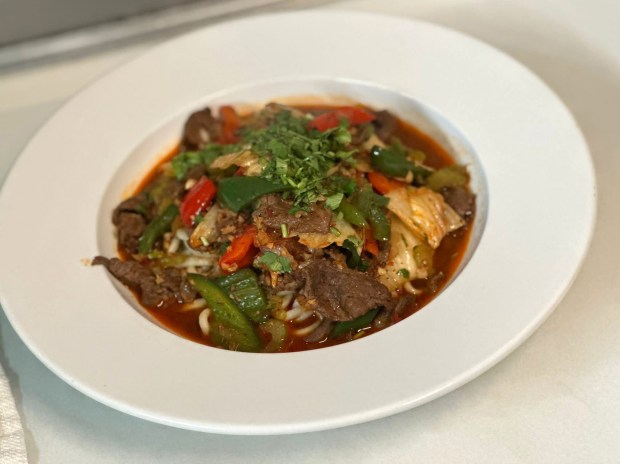
This range of Kyrgyz-owned restaurants, which has Turkish, Persian and Indian influences, offers a few different options for fasting customers. At their new Karavan location, a dozen or so dishes are on rotation at their iftar buffet ($40), including soups, fresh salads, and comforting entrees like kebabs and plov, as well as dessert. The regular menu is available from 11 a.m. until iftar time. At Jibek Jolu Chicago, diners can grab an iftar combo ($20) of an entree with a choice of soup, appetizer or salad. A sample order includes shashlik chicken with lentil soup. Tea, bread and dates are complimentary.
Jibek Jolu Chicago, 5047 N. Lincoln Ave., 773-878-8494; Karavan, 851 W. Oakton St., Des Plaines, 224-519-0323; jibekjolu.us
Kabul Kabob Afghan Grille
This Bridgeview restaurant with a focus on kebobs grilled over charcoal offers a $30 iftar buffet at dinner time. The dishes on offer rotate but expect many Afghani classics: qabuli palow, badinjan, dips and kabobs. In addition, the restaurant says they offer food that has a bit of an Arabic and Indian twist: qatayef, biryani, firni and more. Afghani tea and desserts are also available daily.
7265 W. 87th St., Bridgeview, 708-529-0590; kabul-kabob.com
Tandoor Char House
Chef Faraz Sardharia and his team at Tandoor Char House offer a daily three-course Indian-Pakistani Ramadan iftar prix fixe dinner menu ($50), as well as a sampler platter of dishes South Asians traditionally eat after breaking the fast with a date: spiced fruit chaat, pakora and samosa. On weekends, the restaurant offers nihari, the national dish of Pakistan. The restaurant also plans to continue a tradition of providing free meals to those in need in collaboration with local nonprofit ChiCares. Note: takeout only at all locations until April 1 due to renovations. The Halsted location plans to open for dine-in service on April 1.
Locations vary, tandoorchicago.com
Tary Coffee House
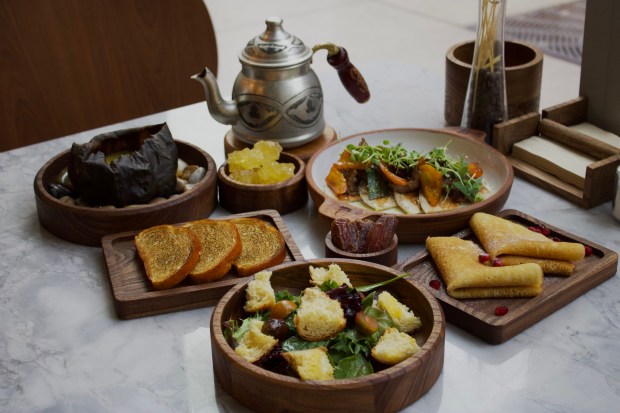
The new Kazakh cafe in River North has an iftar menu with two three-course meals, served with traditional dates, bread and unlimited tea. One of the meals includes lentil cream soup, chicken with wild rice, vegetables and carrot cake for dessert. A second option has pumpkin cream soup, myzhyma salad, kazan jappa with beef and concludes with quymaq. A full dinner is $46 or $40 without dessert.
111 W. Illinois St., 773-322-7315, tarycoffee.com
Limited-run items
Cedars Mediterranean Kitchen
Alongside their mainstay falafel and shawarma offerings, this small Hyde Park joint is a great place for iftar takeout. Their Ramadan plans include a musakhan special: roasted Palestinian chicken on a bed of caramelized onions and pita, garnished with sumac, parsley, and pine nuts and served with side of mint cucumber yogurt salad. A portion of proceeds from the sale will be donated to Pious Projects for emergency aid in Gaza. Available March 15 to April 8, but their social media is the best way to stay up to date with their ever-rotating menu.
1206 E. 53 St., 773-324-6227, eatcedars.com
Chocolat Uzma
The South Asian-inspired chocolate shop in Pilsen is offering a limited edition collection of covered dates ($32) with flavors like pistachio orange, toasted sesame, cardamom halwa, chocolate plum, hazelnut lemon and s’mores for the holiday. Also for sale are a gift box of two chocolates with an edible Ramadan Kareem label ($7) and a salted date cake ($15) made with Yuma Farms Medjool dates. Available in store and online for shipping.
917 W. 18th St., 312-900-9170, chocolat-uzma.com
Port of Peri Peri
An iftar to-go box and Ramadan platter are both available from the Villa Park and Schaumburg locations of the fast-casual chain that specializes in marinated chicken. The to-go box includes rice, salad, a peri pepper and two dates along with your choice of legs, thighs, wings, a wrap or falafel and a sauce for $15. To feed a crowd, a $65 platter includes salad, hummus, toasted pita, peri falafel, a whole chicken and eight wings along with two more large sides.
Locations vary, myperiperi.com
Sweet Reserve Bakery
Delight family and friends with a box of Ramadan-themed sweets like cakesickles, sugar cookies and their signature ras malai tres leches cake in the shape of a crescent moon and decorated with a Ramadan Mubarak acrylic cake topper. Opening hours were extended to 11 p.m. Sundays through Thursdays and until 1 a.m. on Fridays and Saturdays during Ramadan.
625 E. Roosevelt Road, Lombard, 331-899-4899, sweetreservebakery.com
ZmZm Sweets
The Amman, Jordan-founded dessert chain in Chicago Ridge is serving sweets such as qatayef (stuffed pancakes served traditionally during Ramadan), kunafa, baklava, fresh pressed juice and Turkish coffee prepared the traditional way in sand from its new coffee bar.
10511 S. Harlem Ave., Chicago Ridge, 708-307-6491, zmzmsweet.com
Charity and community
Holy Buckets Halal Chicken and Pizza
This tongue-in-cheek chicken shop, with its kaffiyeh-clad chicken mascot, announced it will donate the entirety of its sales during Ramadan to feed people in Gaza in a “Ftoor for Falasteen” partnership with Bridgeview nonprofit Pious Projects. Though proudly Palestinian, their menu has halal twists on American fast-food classics: from Gaza chicken strips to zabiha pepperoni pizza. They plan to stay open late on Friday and Saturday to 4 a.m. during Ramadan.
7331 W. 87th St., Bridgeview; 7150 McCormick Blvd., Lincolnwood; 708-931-4659; holybucketschicken.com
MOTW Coffee & Pastries
Hours are extending at the Lombard location until 1 a.m. Mondays through Thursdays, and until 3 a.m. Fridays through Sundays, where customers can kick back and celebrate with special Ramadan-themed cups. On March 15, the cafe will raise money going toward emergency kits for people living in Gaza, and customers can donate any amount to receive a small drink and pastry in exchange.
109 S. Main St., Lombard, 331-307-7174, motw.coffee
Extended late-night hours
Bulsho Restaurant
The Near North Side Somali cafeteria-style spot with a mosque inside is typically open from 6 a.m. to 1 a.m. A representative on the phone said they shift their hours during Ramadan, serving food from 3 p.m. to 2 a.m. The menu changes often here, but rice, meat and Philly cheese sandwiches are staples. And make sure to get a cup of spiced shaah (Somali tea). Bananas on request, per Somali culinary tradition.
211 W. Walton St., 312-265-0198
Chai Ho Jai
Late-night hours for Ramadan at the new Indian-Pakastani tea room in Naperville are 5:30 p.m. to 2 a.m. Sunday through Thursday and 5:30 p.m. to 3 a.m. Friday and Saturday. Reservations are requested for the 6 p.m. to 8 p.m. time slots. Along with your choice of traditional teas, iced drinks and lattes, iftar dishes include beef bihari paratha, chicken boti paratha roll, and for the pre-dawn meal, a fried egg, chicken cheese omelet or dum ka keema, a spiced meat curry. Customers can also expect complimentary drinks like water and rooh afza and dates and pakora to snack on.
3037 English Rows Ave. #101, Naperville, 331-472-4184, chaihojai.com
Chi Tea
Chi Tea is a youthful spot that offers a mix of Nashville hot chicken sandwiches, bubble tea and fries. The local chain’s Lombard and Schaumburg locations plan to offer super-late night suhoor hours on the weekends. Check their social media and websites, but representatives for Chi Tea said they plan to be open until 3 a.m. on weekends, perhaps even later.
413 E. Roosevelt Road, Lombard; 602 W. Wise Road, Schaumburg; officialchitea.com
Haraz Coffee House
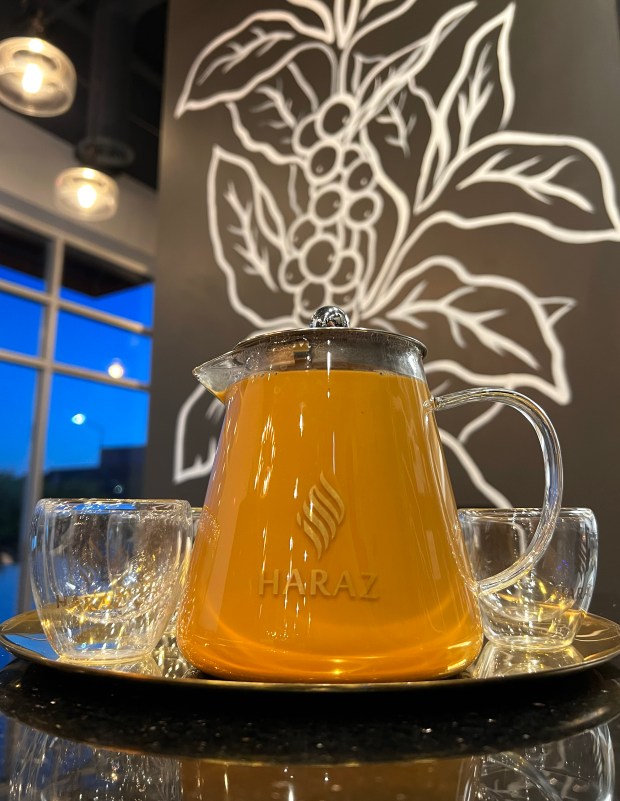
The Orland Park outpost of the Yemeni cafe chain is celebrating its first Ramadan ambitiously. They plan to shift their hours to 8 a.m. to 4 a.m. every day of the holiday. Kick back with friends after dinner with a communal pot of harazi coffee, adeni/karak chai, or qishr ($20 for a medium, $25 for a large). This location says they are unique amongst Haraz franchisees by baking several pastry items in house. Keep an eye out for Ramadan specials, like qatayef.
13137 LaGrange Road, Orland Park, 708-608-8760, harazcoffeehouse.com
Qahwah House
The Michigan-origin Yemeni cafe has quickly become a late-night Ramadan staple for Muslims of all ages at their Lombard and newer Skokie franchise locations. Already open late for a coffee shop, both Illinois locations will offer extended Ramadan hours again this year (closing 2 a.m. on Friday and Saturday, 1 a.m. every other day). The chain is known for specialty Yemeni coffee beans and drinks; despite that, the most popular order is the Adeni Chai, served in a large communal pot ($19) and evocative of many tea traditions through Indian Ocean cultures. Order a slice of sweet and creamy honeycomb Khaliat Al Nahl ($6) to share. There’s plenty of seating at both locations, but they fill up late at night.
406 E. Roosevelt Road, Lombard; 630-519-3632; 5238 W. Touhy Ave., Skokie; 847-305-1108; qahwahhouse.com
Quesabirria Jalisco
The viral Pilsen taco shop has been growing in popularity among Muslim diners and plans to offer late hours for fasting customers. Owner Ventura Orozco distinguishes himself from many of the taco shops on 18th Street by eschewing from cooking with pork and alcohol and serving halal meat, even though he doesn’t identify as Muslim. Typically, the store runs one shift daily until they sell out. For Ramadan, they plan to add a second shift that begins at 7 p.m. and ends around 2 a.m., satisfying customers who crave spicy suhoor quesabirria with consomme. A four-pack with one side of consomme runs $20 and is available in family packs and with chicken and shrimp as well. It’s typically closed on Mondays and Tuesdays.
1314 W. 18th St., 773-771-2123, visit-chicago.com/birria-tacos-consome-quesabirria


